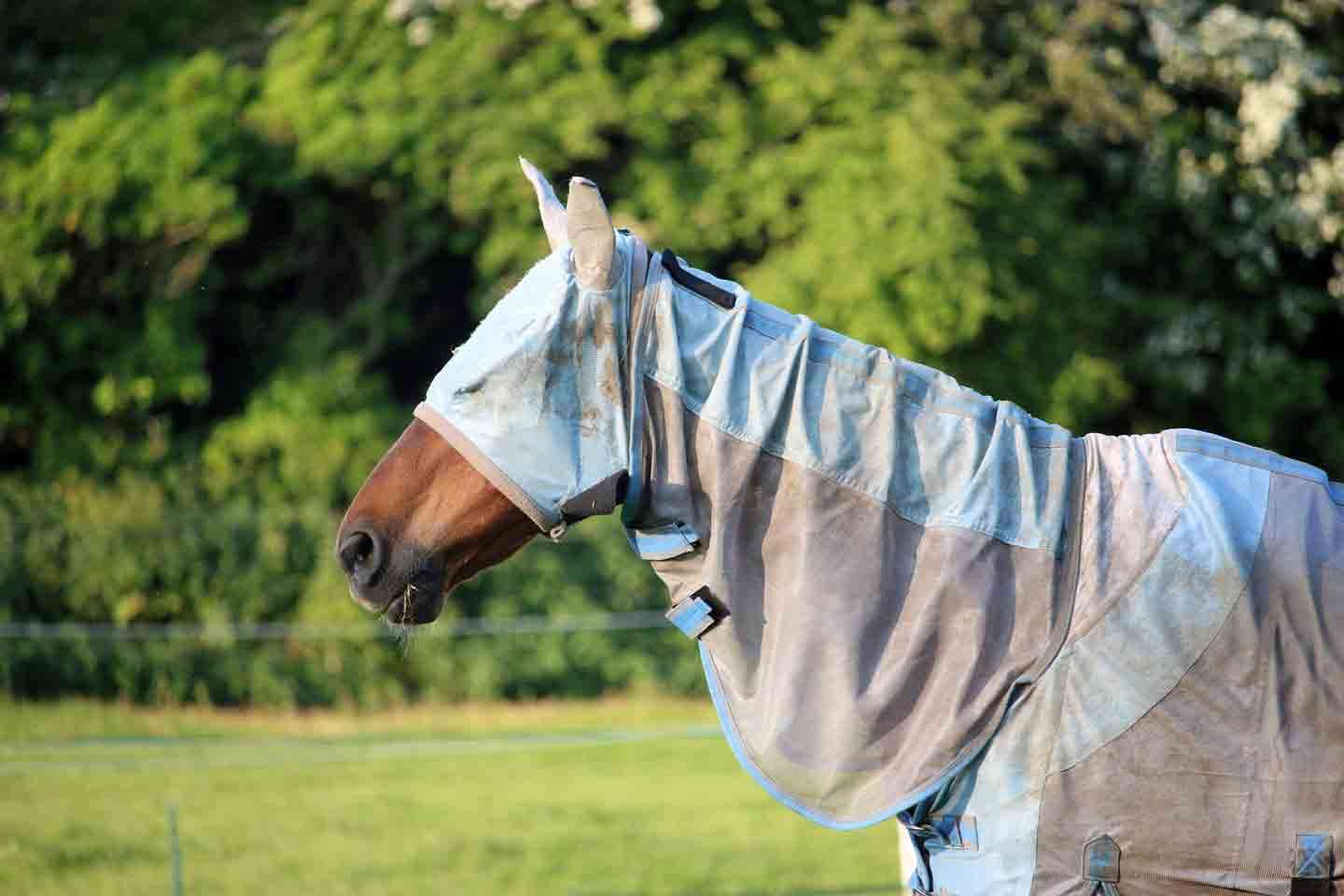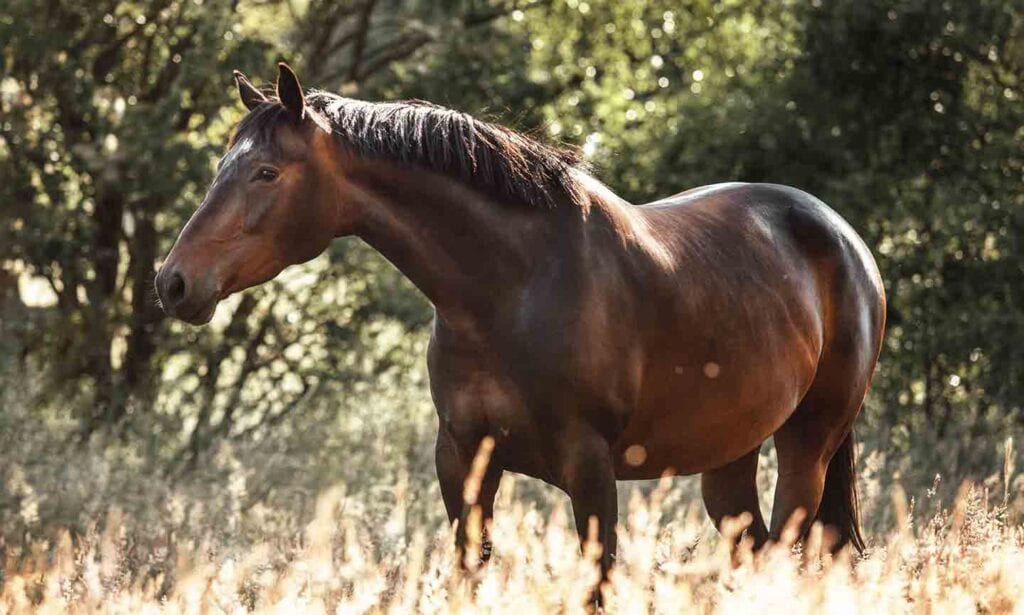In This Guide
4 Types of Insects That Bite Horses
There are many types of biting insects that seek horse blood. According to the Merck Veterinary Manual, the most common are:
- Mosquitoes: These have been described as “the most voracious of the blood-feeding insects.” These tiny, buzzing creatures often make stagnant water their breeding grounds, laying their eggs on the surface, which is why swampy conditions are riddled with mosquitoes. Mosquitoes are especially dangerous to horses because they can transmit viral encephalitides (brain inflammatory diseases), including Western and Eastern equine encephalomyelitis (WEE/EEE) and West Nile virus (WNV).
- Biting midges: Also called gnats and no-see-ums, these tiny, gray, two-winged flies live in wet soil. They deliver painful bites and suck blood, and many horses develop allergies to their saliva, making them the main culprits in insect bite hypersensitivity (read on to learn more about this condition).
- Stable flies: These are blood-feeding insects known for pestering animals and humans alike. They look like house flies—picture your typical black fly—but slightly smaller, and they bite! Stable flies exist throughout the world; in the US, they are found mainly in the Midwestern and Southeastern states.
- Horseflies: These are the largest beasts on this list, some longer than an inch. Their bites are painful and draw blood, creating oozing wounds. Aptly named, these black insects with gray wings (although coloration can vary) feed off horse blood and are the hardest to kill with traditional fly repellents. Larvae develop in aquatic to semi-aquatic areas, making horseflies more prevalent in tropical climates. Horseflies are especially dangerous because they can transmit diseases, such as anaplasmosis and equine infectious anemia (EIA).

Top 3 Risks of Fly Bites on Horses
1Insect Bite Hypersensitivity
Insect bite hypersensitivity (IBH) is a common skin reaction to insect bites. While IBH is a seasonal problem during the summer months up north, horses in tropical climates such as Florida can suffer from this condition year-round, says Dr. Lisa Fultz, DVM, MS, DACVIM, at Paddock Equine Veterinary Services in Wellington, Florida. “IBH presents as small hives and crusts on the abdomen and neck/mane, often with itch (pruritus) and hair loss (alopecia),” she says.
2Transmission of Infectious Diseases
A serious health risk from insect bites is the transmission of infectious diseases. Mosquito and horsefly bites, in particular, can transmit all sorts of potentially fatal infectious diseases to non-vaccinated horses via blood contamination, including Western and Eastern equine encephalomyelitis (WEE/EEE) and West Nile virus (WNV).
3Summer Sores
These are some of the most common and frustrating types of fly-related problems, says Dr. Fultz, who is a board-certified equine internal medicine specialist. Summer sores commonly affect the inner corner of the eye, aka the conjunctiva; the opening to the penile urethra; or a wound on the skin. They’re caused by the larvae of roundworms (usually the Habronema species), which flies carry and deposit in these moist environments. “Once the larvae invade the tissue, they cause ulcerations within the tissue along with firm scarlike tissue,” Dr. Fultz says.
Symptoms of Fly Bites on Horses
Signs of fly bites on your horse’s skin include:
- Urticaria (hives): These are small bumps that appear on the horse’s skin as a result of an allergic reaction, in this case, to the saliva of a biting insect.
- Itching: The saliva of biting insects is an allergen that can cause an intense itching sensation, as you’ve probably experienced with mosquito bites on your own skin.
- Alopecia (hair loss): This can occur when horses rub and scratch their itchy skin after being bitten by insects.
Treatment of Fly Bites on Horses
If you find your horse covered in hives, or realize that they’ve rubbed off a good chunk of their tail trying to get an itch, don’t panic. While they do require your attention, these scenarios are more uncomfortable (for your horse) and frustrating (for you) than they are dangerous.
First, consider what might be causing your horse’s symptoms. “Take inventory of the situation to help your vet deduce … how to best proceed,” says Dr. Fultz. “Was the horse outside or in the stall when these signs appeared? Was it after eating or a change in bedding? Were any [new] medications or supplements administered?”
Dr. Fultz also recommends taking photos to show your vet, and rinsing off your horse to get rid of potential irritants that may have come in contact with their skin, such as bedding or plants they are allergic to.
You should contact your vet if clinical signs persist, worsen or recur, or if your horse is visibly uncomfortable or in distress, such as showing signs of lethargy or respiratory distress.
“Antihistamines like cetirizine and hydroxyzine are helpful at preventing further hives from developing but often have no direct effect on the hives that have already developed,” Dr. Fultz says. “Low doses of corticosteroids are occasionally needed to resolve the hives by ‘toning down’ the immune allergic response that has been set in motion.”
With that goal in mind, your veterinarian may also recommend topical itch-relief shampoos, sprays and ointments to calm down the body’s inflammatory response from the fly bites. These may include steroids and could require a prescription.
Prevention of Insect Bites on Horses
Repelling flies on horse farms is not always easy! There are several steps you can take to reduce the biting insect population at your farm, Dr. Fultz says:
- Provide a clean environment, which includes proper and timely manure disposal. Flies love poop!
- Avoid stabling or turning out horses near bodies of standing water (e.g., ponds, canals) that could support certain insect populations’ breeding activities, notably mosquitoes. Dr. Fultz recommends at least a 0.5-mile distance between barns or paddocks and standing water.
- Use strategic turnout schedules. For hypersensitive horses avoid dusk and dawn, as biting insects are most active at these times.
- Keep sensitive horses under fans to disrupt insects’ flying patterns. The strong airflow makes it more difficult for bugs to land on your horse.
- Equip your horse with fly gear. Nowadays, it is possible to outfit your horse in protective mesh gear from head to toe! Fly sheets, fly masks and fly boots all help cover up your horse and limit the amount of exposed skin that’s vulnerable to biting insects.
- Use fly spray liberally. Dr. Fultz and other experts recommend fly spray that contains 1 percent permethrin—an insecticide that targets biting midges, the main culprit of IBH—in addition to another class of insecticides called pyrethrins. A good example of such a product is Farnam’s Tri-Tec.
- Support a healthy skin immune system with omega-3 fatty acids in your horse’s diet.
FAQs About Fly Bites on Horses
Q:
How do you treat horse fly bites?
Q:
What do fly bites look like on horses?
Q:
How do I stop horseflies from biting my horse?
As you can see, there is a lot you can do as a horse parent to help keep your beloved equine companion safe from the nuisance and health risks of insect bites. And don’t forget your fly protection when you hit the trail with your horse!
Expert input provided by Dr. Lisa Fultz, DVM, MS, DACVIM, who is a board-certified internal medicine specialist at Paddock Equine Veterinary Services in Wellington, Florida. Dr. Fultz has also earned a Master of Science in Veterinary Biomedical Sciences.
This content was medically reviewed by a Chewy veterinarian.
More About Horse Health
Share:













